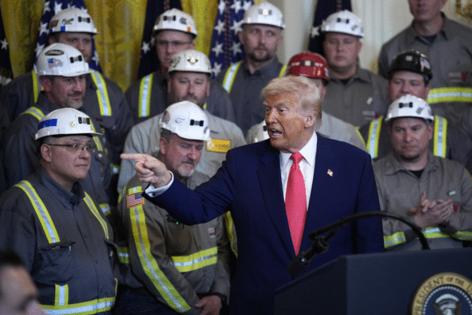Editorial: American 'state capitalism' is destined for failure
Published in Op Eds
Call it industrial policy, state capitalism, old-fashioned socialism: It’s a bad idea. Across several recent administrations, the U.S. government’s role in the economy has grown increasingly intrusive. The current White House has taken things to an extreme. It’s a tried-and-failed experiment that should be scrapped before it does any more harm.
Citing a variety of goals — protecting national security, bolstering supply chains, boosting domestic manufacturing — the administration has been giving itself “a piece of the action,” as the commerce secretary puts it, in company after company.
So far, it has taken a 10% stake in Trilogy Metals Inc.; a $400 million chunk of MP Materials Corp.; a possible 5% share of Lithium Americas Corp., along with a cut of its Thacker Pass project; a “golden share” in United States Steel Corp.; and a 10% piece of Intel Corp. It has also offered export-control exemptions to Nvidia Corp. and Advanced Micro Devices Inc. in exchange for 15% of the resulting revenue. The president has mused about more such deals to come. (“I want to try and get as much as I can,” he says, believably.)
Decades of hard experience show the perils of such intervention. Outside of genuine emergencies, it is likely to lead to misallocated resources, slower growth, less dynamism and more rent-seeking. Far from strengthening domestic industry, it will favor incumbents over startups, delay needed reforms and restructurings, and invariably prioritize politics over productivity. It’s a formula for stifling innovation and enfeebling the competitive spirit.
Unfortunately, “state capitalism” is fast becoming formal policy in numerous respects. One recent analysis found that the U.S. now doles out nearly $200 billion in direct subsidies for favored businesses each year, thanks partly to splurges from the Infrastructure Investment and Jobs Act, the Chips and Science Act, and the Inflation Reduction Act.
This largesse may support faltering companies or satisfy political constituencies — it may even have social benefits, as with green energy — but over time it will likely invite corruption, waste tax dollars and sap ambition.
In the same spirit, the president has imposed an expansive tariff regime, affecting trillions of dollars in trade, in hopes of reshaping the economy according to his priorities. At nearly 19%, by one estimate, the U.S. average effective tariff rate is now higher than at any time since the 1930s. Such duties will not just raise prices, slash output and erode real wages — they’ll also shield domestic companies from the salutary effects of global competition.
To say the White House is picking winners and losers, then, would be an understatement. It offers ad hoc tariff exemptions for the politically pliable. It props up favored factories with make-work jobs. It provides a “concierge approach” to fossil-fuel permitting while all but outlawing wind projects. Its more distinctive ideas — a sovereign wealth fund, a strategic Bitcoin reserve, a manufacturing “investment vehicle” — all reflect the same thinking: Where capital is concerned, the government knows best.
Time was, Republicans opposed such intrusions, and rightly so. They’re antithetical to American capitalism. If the U.S. continues down this path, expect ever-changing rules, unbridled lobbying, exemptions and exceptions for the well-connected, and perpetual uncertainty for any company hoping to make an honest investment. Rather than competing on the merits, business leaders will need to get wise to the ways of Washington.
If it wants to boost the economy, the administration should stop helping itself to equity stakes and instead focus on the basics: prudent regulation, sound infrastructure, top-notch research, pro-growth tax reforms and perhaps even a modicum of stability in Washington. It should remember that the U.S. economy became the wonder of the world thanks to free markets and vigorous enterprise, not central planning.
_____
The Editorial Board publishes the views of the editors across a range of national and global affairs.
_____
©2025 Bloomberg L.P. Visit bloomberg.com/opinion. Distributed by Tribune Content Agency, LLC.
























































Comments